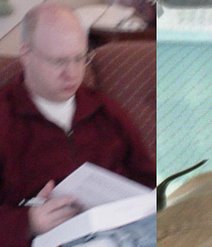 Last week I asked the question of whether belief in the resurrection of Jesus is justified and referenced the book, Jesus' Resurrection: Fact or Figment?, edited by Kreeft and Tacelli. Here are my thoughts on that book.
Last week I asked the question of whether belief in the resurrection of Jesus is justified and referenced the book, Jesus' Resurrection: Fact or Figment?, edited by Kreeft and Tacelli. Here are my thoughts on that book.The core portion of the book is the transcript of a 1997 debate at Boston College between William Lane Craig, a Christian philosopher and apologist, and Gerd Lüdemann, a German New Testament scholar. Tom Wright has also debated Lüdemann on this subject (though I have not been able to find a transcript), which added to my anticipation of the book. The book is comprised of four responses to the debate, two siding with each opponent, followed by response essays by both Lüdemann and Craig.
I expected to find strong arguments from both debaters, since each is highly respected in his respective field. I hoped to be challenged on some points, and be forced to think through the relevant issues related to the resurrection. I anticipated a straightforward and objective book.
Unfortunately, I was disappointed with the actual content of the book. Beginning with the debate portion itself, it seemed that Craig was clearly the better debater. In his opening statement, Craig laid out his argument and then critiqued Lüdemann’s position before it had even been given. This one-two attack and counter-attack seemed to throw Lüdemann mentally off balance. In a total spirit of confusion, Lüdemann tried to alter his opening statement on the fly to be more responsive to Craig. Perhaps he figured that he was already going to address the issues, so why not rearrange them to correspond with Craig’s four “facts”, critiquing Craig’s argument while laying out his own. Unfortunately, he succeeded in neither. This made for an awkward rebuttal for Craig, who had been given no real opposing position to respond to.
Unfortunately, I was disappointed with the actual content of the book. Beginning with the debate portion itself, it seemed that Craig was clearly the better debater. In his opening statement, Craig laid out his argument and then critiqued Lüdemann’s position before it had even been given. This one-two attack and counter-attack seemed to throw Lüdemann mentally off balance. In a total spirit of confusion, Lüdemann tried to alter his opening statement on the fly to be more responsive to Craig. Perhaps he figured that he was already going to address the issues, so why not rearrange them to correspond with Craig’s four “facts”, critiquing Craig’s argument while laying out his own. Unfortunately, he succeeded in neither. This made for an awkward rebuttal for Craig, who had been given no real opposing position to respond to.
I personally felt that the debate gave a good show of Craig’s debating prowess, and left little room for the facts to do their own job. In short, I felt cheated. It could have been a much more satisfying debate for everyone had Lüdemann spoken first instead of Craig, which would allowed us to hear his original opening statement in full. Alternately, Lüdemann could have been given time for his first rebuttal before his opening statement.
In the book as a whole, the editing favored the Christian position in several ways. First is the imbalance between philosophy and New Testament scholarship. Craig, a philosopher, had his argument strengthened by Gundry, a New Testament scholar. Lüdemann had no similar support on the philosophical side. Second, the editors chose a debate that had already been conducted. They already knew that Lüdemann had faired poorly. Third, the editors framed the book at the start with an introduction that emphasizes the Christian implications of the debate. I’m not sure that a non-Christian would be in agreement with Copan and Tacelli about the importance of the issue. (It is primarily Christians that are interested in these sorts of debates, as demonstrated by a brief glance at reviews of this book on amazon.com.) Finally, the book was framed at the end with Craig’s essay rather than Lüdemann’s, even though a strictly objective arrangement would likely follow their order in the debate.
This book can establish a grid for later reading on the resurrection. However, parts of the grid, especially the non-evangelical perspective, will need to be supplemented with more substantial books. A stronger case can be made against the resurrection than this book presents, so we should not be led to think that Lüdemann has given us the best that a skeptic has to give. Lüdemann’s concluding suggestion for a “new language of interpretation” (158) is particularly troubling. Looking to the gnostics for his inspiration, he states that “one’s stability is not assured by trust in the creator but rather is threatened by it… [T]he Gnostic idea of the unwavering race opens up an area of stability, steadfastness and depth – in short a ground on which I can stand in the struggle and mystery of life into which all of us have been thrown.” (161) He is not far from Anton LeVey’s vision for humanity as presented in The Satanic Bible. This sort of spirituality is blasphemous to the theist, bizarre to the naturalist, and unlikely to win either.


No comments:
Post a Comment